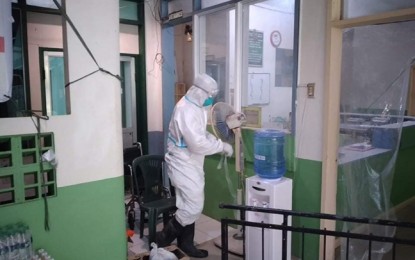
A closed hospital, the Dipolog Medical Center (DMC), is reopened to accommodate quarantined individuals. (Photo courtesy of Dipolog Medical Center)
DIPOLOG CITY – With no swab test facility accepting its specimens, the Zamboanga del Norte Inter-Agency Task Force (ZN-IATF) is waging a blind battle against the 2019 coronavirus disease (Covid-19).
“That’s true, our specimens were frozen or put on hold because we (swab test facilities we sought) ran out of reagents and the RITM (Research Institute for Tropical Medicine) refused to receive our specimens because of their huge backlog,” Dr. Esmeralda Nadela, ZN-IATF vice chairperson, said Friday.
Nadela said she already asked help from the regional office of the Department of Health for Reverse Transcription Polymerase Chain Reaction (RT-PCR) or swab tests, “but the best we can do is to wait for the completion of another RT-PCR facility in Zamboanga”.
“We badly need the RT-PCR facility as people are on the verge of panic because until now, we cannot yet ascertain where our first Covid-19 case acquired the disease or did he make local transmissions,” Nadela said.
As Zamboanga del Norte was placed on general community quarantine in the middle of last March, pulmonologist Philip Limsi said the province is "in a blind battle" against the pandemic for lack of RT-PCR testing facilities.
The province later found ways to send swab specimens to RITM and eventually to other testing facilities in the cities of Zamboanga and Davao.
On May 4, a Norwegian with probable heart disease and airlifted from Dipolog City to Manila was found positive of Covid-19 in a test at St. Luke’s Hospital. Two recent repeat tests found him clear of Covid-19.
Considering the Norwegian as Zamboanga del Norte’s first case of Covid-19, the ZN-IATF went on contact tracing and eventually put on quarantine 82 persons, who were also given Rapid Antibody Based Test.
Although ZN-IATF was prompt in announcing that 69 of 82 persons got negative results, the task force kept on dodging questions on whether the rest – who were among the 17 persons whose swab specimens were taken last May 7 for RT-PCR test in Davao – were actually positive in the rapid tests.
At a press conference Wednesday, Nadela finally said some of the 17 individuals tested positive in the rapid test without specifying how many.
In contrast, the ZN-IATF was quick to organize the May 13 press conference to announce that a 17-day old baby from neighboring Polanco town was found positive of the rapid test.
This prompted Lawyer Anecito Young, human rights lawyer and publisher of two weeklies in this city, to criticize ZN-IATF as having "double standard" in disseminating information related to Covid-19.
“In my opinion, maybe it was because the baby was poor while some of those in close contact with the Norwegian and found positive in the rapid tests were prominent people,” Young said in the dialect.
Young claimed he received reports that positive results were also found in the rapid tests given to the 82 persons identified in the contact tracing.
He also pointed to the radio statement of Dr. Ruben Arcilla, president of the group of internists in this city, that the government was not prepared for quarantine and that he and his fellow physicians even had to bring food to quarantined patients.
“It is an indication that prominent or rich people are being quarantined because the poor cannot afford private physicians,” Young said.
In an interview Thursday, Arcilla said he spoke over the radio mainly to explain the difference between rapid testing and RT-PCR.
“Rapid test is not official, highly inaccurate with only 43 percent sensitivity and it detects antibodies, not Covid-19. The RT-PCR should be our basis for Covid-19, and so far, only the Norwegian or Patient 01 is on our records,” Arcilla said.
He explained that when a bacteria or virus called pathogen enters the body, the body develops antibodies to fight it. Rapid test detects antibodies, which is classified into IGM or newly developed and IGG or have already recovered from the disease created by the pathogen. (PNA)
